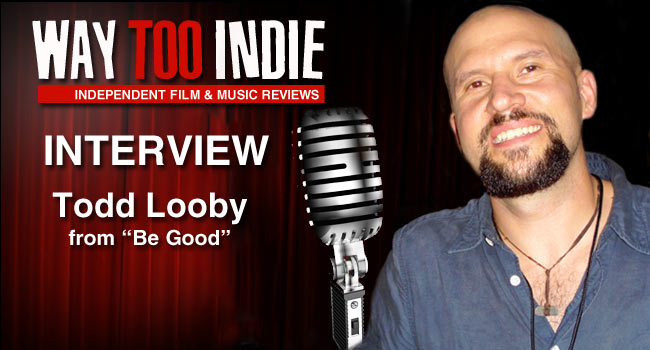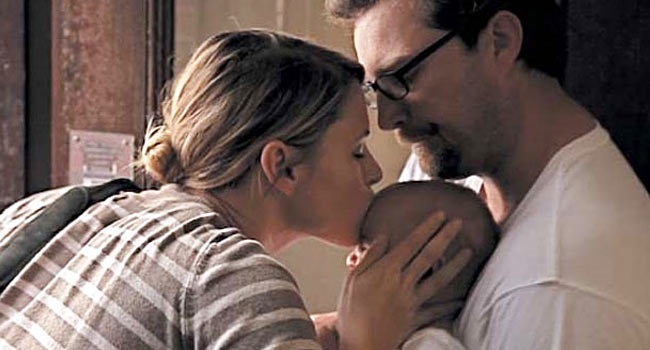Interview: Todd Looby – Be Good

Be Good was number two on our top 10 list of films at this year’s SF Indiefest (check out our review), and director Todd Looby spoke with us about the movie, his filmmaking process, working with Joe Swanberg, what makes a good film festival, if he’s competitive with other filmmakers, and much more. Be Good will be hitting the Florida Film Festival in April.
The film follows Paul (Thomas J. Madden), a filmmaker stay-at-home dad, and his wife, Mary (Amy Seimetz), as they take care of their newborn baby girl and struggle with the balancing act that is parenthood.
Where did you get the idea for Be Good?
Be Good came out of a two-week period where I had taken over watch of my daughter, Tessa, after my wife’s three month maternity leave. I thought it would be a lot easier than it was. I thought she would sleep, (while I) worked. As long as I could work, I could do what I wanted to make a living and be the breadwinner of the family. (That idea has) been drilled into my head since I was a young child. I want(ed) to do my fatherly duty. The day-to-day duties of being a father (doesn’t allow for much) sleep and didn’t allow me to work. I was just…stuck. I couldn’t do the things I thought a father should do. As I got used to it, I figured out just how good of a situation I was in. I took all the drama and all the anxiety I felt in those two weeks and dramatized it to play out the extremes of what were going on in my head. I wrote an 8 page extended outline, (which) wound up becoming the (film.)
As a father, your primary duty is to take care of your child. Now, that can be two things. You can take care of them materially, or you can take care of them with love. Those things always come into conflict. Throw ego in the mix, and it further complicates things. You have to provide for your family by earning money, but you also have to provide love. Ego seems to push you toward looking good to the outside world by providing for your family through your career. It’s this constant juggling act…where you have to continually kill your ego.
Is (the main character) Paul anything like you?
I would say not. What I did in constructing Paul was put someone in my situation, (but have) him make really poor decisions and be a lot more arrogant than me. My thought was, if we made a character just like me, in (my situation), it would be pretty boring. I definitely dramatized it and fictionalized a lot (about) the character.
So were most of the dramatic scenes in the film fictionalized?
There would be little situations that would happen to me, and I would say “Wow, what if I was a total moron. How would this play out?” I think I constructed it in a way that it did work (and was) interesting to watch.
You are in the film, but you play TJ, Paul’s friend. How was that?
I loved playing TJ. He is a guy who is in the exact opposite situation that I was in. (He’s a) bachelor with no job, no real aspirations. (He’s) just a guy who sits around and gets stoned all day. It was a lot of fun to step outside of the responsibilities I have in day-to-day life. Not that I would want to be TJ (in real life.)
But he’s a great friend!
Yeah. I have friends that are similar to him. The thing I like about TJ which I find in a lot of my friends is that they’re always there criticizing you, sometimes encouraging you, but at the end of the day, they’re always your friend, no matter how bad you screw up.
Why didn’t you play Paul?
I was planning on it, but about a week out from production, the guy who was supposed to play TJ dropped out. I was always on the fence about playing Paul. It was (maybe) hitting too close to home. It felt a little weird. I wound up having a conversation with (Thomas) Madden who wound up playing Paul, and it just hit me that he should be the one playing Paul. He would be the best person to do this. He agreed and helped produce it, so everything sort of came together magically. He does a way better job than I would ever do!
How did you assemble the cast and crew? You’ve got some very talented people who worked on the film.
I contacted Joe (Swanberg) in March of 2011. When I first thought of the movie, I thought if we’re going to do this movie about a guy who has a terrible attitude and has all these doubts about his (filmmaking) career, who better a person for him to talk to than Joe? His daughter was born two weeks after my baby in the same hospital, and I saw Joe (around) and always had that in my head. I contacted Joe and asked if he’d be in the movie. His film Uncle Kent was screening at the Siskel film center, so I went there and met Frank V. Ross and Jim Jacob. (Jim) has a cameo in the film as a film festival director, and Frank wound up doing sound (for the film.) Frank hooked me up with Mike Gibisser (cinematographer.) So that was all set. I asked Joe for Amy’s email, and I emailed her, we had a conversation, and she was sold. Two months later, we were shooting.
I expanded the role of Mary when Amy came on set because she was so easy to work with. Just seeing her be in that role, I wrote in a couple things while we were there to get to the meat of that role, which is essentially the most important role in the film. One of the things I noticed during that two-week period (when I came up with the idea for the film) was the biological attachment that my wife Monica had with Tessa. It was something beyond intellectual understanding. Fathers have something special too, but there’s something extremely unique about a mother’s bond with her child. It was something that I thought was magical. A lot of our friends who are moms of newborns are highly educated, very ambitious women, but when their baby came along, most (of them) wanted to stay home. Amy really embodies that whole spirit in the character.

In the film, you suggest that Mary’s eye might be wandering to a co-worker. What I liked was that you were subtle with it and didn’t hit us over the head with the situation. Explain your choice to tell your stories so realistically.
I think a lot of things are unnecessarily overdramatized in films. I think the power of suggestion is way stronger than (showing.) Planting an idea in someone’s head, if you’re communicating with the audience…you know…they see it, they know what’s happening, and they know the subtext. To go beyond (suggestion) I think is cheating a little bit because in real life, the vast majority of those (type of) interactions with co-workers never materialize into anything scandalous.
You know, when you have a filmmaker making a movie about an artist, like Woody Allen making a movie about a filmmaker, you know he’s talking about his artistic process. I just wanted to be straight with it and play things out realistically. That’s my approach to filmmaking in general; seeing how much I can gauge an audience without using dramatic stops, showing explicit sex, violence. (I’m) just trying to engage with people’s heads.
At SF Indiefest, you said that what surprised you most about having a newborn was how much focus is put on the pre-birth phase of the baby’s life in society, and not what happens after the baby is born.
That was a big surprise. After Tess was born, we discovered that she didn’t want to sleep. I really never heard that that was a problem before. I honestly can’t think of one person who said “sleeping is so key.” I just can’t believe it, because after you have a baby, that’s the first question couples ask each other. “How’s she sleeping?” It makes all the difference in the world for your sanity. It’s crazy. (I) wish they had “after-birth” classes! It was a lot of trial-by-fire (learning.)
What makes a good film festival?
First of all, the program has to be solid. Any festival can (not) provide us with money or any other things big festivals have, as long as you have good films and filmmakers that are interesting and talented with whom you can hopefully collaborate later with and ask for advice. That’s how I judge a festival, by how good the program is. (Secondly), it’s nice for them to have a budget to give me some free stuff now and again. At the very least free beer. A filmmakers’ lounge is good. It facilitates the networking and it’s just great to commiserate with everyone.
What type of work can we expect from you in the future? Do you plan to stick to this genre or deviate into something different?
I’m always looking to branch out and do different things. For the past three years on and off I’ve been working on this book adaptation called A Saint on Death Row, a story about a kid on death row in Texas. It’s been interesting to get out into another world. I would love to challenge myself to do something different, but for the most part, I think I’m best at sticking to characters I know first-hand and life situations that I’m going through that I can see reflected in society as a whole. Be Good is not necessarily (just) my experience, but what I’ve seen so many couples go through. I meet a lot of people going through the same thing.
You say you enjoy speaking with fellow filmmakers. Are you ever competitive with them when you make a film?
When I go about making a movie, I don’t think that it’s going to be better than this movie or that movie. No competition comes in at that point. But, when the movie is done and you see it getting passed up by other movies, (I) do get a little competitive there. “That movie won!?” It’s stupid to think that, but you just can’t help it. (However), you can’t let that stuff bother you and you’ve got to cheer other people on, because at this level is definitely struggling. Very few (independent filmmakers) are making a living doing (this), so you have to support them.
